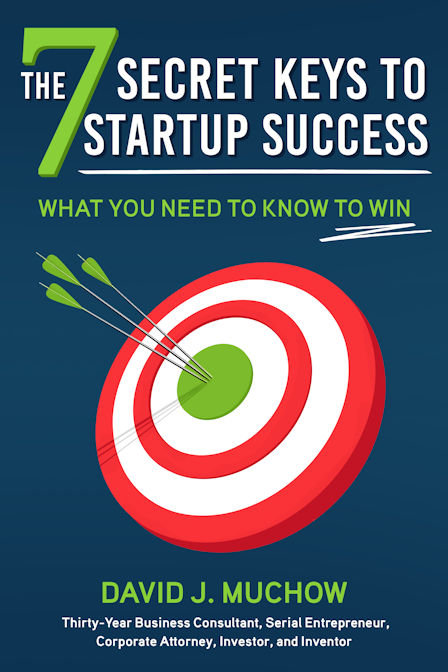


Frequently Asked Questions
Some of the topics covered in The 7 Secret Keys to Startup Success
1. About Author David Muchow
A: If you want to give the most useful and practical advice to entrepreneurs and growing businesses there’s no substitute to having been there and done it; or even better, learned how never to do it! Business requires a broad skill set.
2. About the Book Generally
A: It Prevents “Startup Suicide. TM” I wrote this book for several reasons. First, to help startups and growing businesses avoid the simple mistakes that can kill their business – I call that “Startup Suicide.TM” Eight-out-of-ten businesses fail in the first year but surprisingly, little attention has been paid to why! In working with hundreds of companies over decades I’ve uncovered some of the key reasons for these failures, and The 7 Secret Keys to Startup Success shows how to prevent them.
A: Business books should be fun to read and innovative as well as instructive. So, at the end of each chapter are fun examples/stories, inspired by real events that demonstrate the principles in each chapter using the adventures of Professor Scooter Magee, the Startup Expert. Scooter is a lawyer who travels about in his 1962 Austin Healey convertible and helps startups prevent Startup Suicide and achieve success. But along the way he gets caught up in adventures with the CIA, the mob, and a mysterious secret agent. I hope you enjoy the ride! Think Professor Indiana Jones in Raiders of the Lost Ark meets Silicon Valley!
A: I’ve worked with hundreds of startups over the years and thought a lot about the reasons for their success and failure. Some of the most important reasons for failure – what I call “Startup Suicide,TM” are:
- Failure to build a professional team that can fill in the CEO’s lack of certain skill sets. When you don’t know what to do, you’re more likely to get into trouble.
- Failure to raise enough money to survive the financial “Valley of Death” –when your money is almost out and you’re still waiting for income to come.
- Failure to put important business decisions in writing, which leads to personnel disputes and even lawsuits.
- Failure to have a partners agreement that includes partners obligations, how they can be removed, and how to divide up income, expenses, and equity.
A: There are many, and The 7 Secret Keys to Startup Success walks you through all of them. Among the more significant are:
- Write out a business plan – as Yogi Berra said, “If you don’t know where you’re going you’ll end up somewhere else!”
- Prepare a pro-forma profit and loss statement to be sure that you have enough money to handle the expenses and still make a profit, and
- Get expert legal and financial advice so you don’t make any fatal mistakes as you’re learning what to do and never to do.
Personnel
A: First, know what to say and not say in job interviews. For example, under Title VII of the Civil Rights Act of 1964, it’s illegal to discriminate against someone (applicant or employee) because of that person’s race, color, religion, sex, national origin, age, or being pregnant, so avoid those topics.
- Don’t run a background check without getting written permission from the applicant, particularly when doing a criminal background check or you could be violating the law.
- Be sure to create an employee handbook and have the employee sign a statement that the employee understands it and will comply with it. That will make it legally safer to terminate an employee as long as you follow those rules.
A: When you hire an employee, have a probation period, maybe 90 days, with clear written milestones, expectations, and a detailed, written performance review. The 7 Secret Keys provides an example of one.
Lawyers and Legal Fees
A:
- Yes, lawyers are expensive, but you generally get what you pay for in quality. And it’s less expensive to do things right the first time than to clean up a mistake or legal problem after that egg is scrambled!
- You should use lawyers at the front end of contracts and major deals to help you avoid costly mistakes. Lawyers are trained to see problems before they’re obvious.
- To save money, consider using smaller law firms with lower overheads and tell your attorney up front that you want to keep the costs down. Negotiate a per task billing approach rather than an open-ended hourly rate. If the bill looks too high don’t hesitate to question it.
- And make it clear to your lawyer that you want short and simple answers to your questions, not legal memos that will cost more money.
A:
- Get decisions in writing to avoid disputes and potential litigation.
- Have a partnership agreement to avoid arguments over allocation of duties, income and expenses, and equity ownership.
- If you don’t know what to do, give your attorney a call. Most attorneys will answer short questions without charging you.
- Know the local rules for what you can and can’t do when interviewing or firing personnel – for example, always get written permission before running a background check.
- Don’t enter into a contract without having an attorney review it.
- Don’t lose your intellectual property by disclosing your “secret sauce” by blogging or other public disclosures.
- Don’t take money from investors without knowing the state and federal laws that may require you to file before soliciting funds.

The 7 Secret Keys has more of the critical business and legal advice you need to succeed – whether you’re starting a company or want to supercharge an existing one. It shows you step-by-step how to succeed, from raising capital to marketing, planning, and more. It’s packed with tips, model forms, and practical information you can’t get elsewhere.
Published by Skyhorse
Distributed by Simon & Schuster


![]()
![]()
